- Home
- Tobias Wolff
Our Story Begins: New and Selected Stories Page 11
Our Story Begins: New and Selected Stories Read online
Page 11
“It’s true that we’ve all done things we’re ashamed of. I just wish I’d done more of them. I’m serious,” he said when Ted laughed. “I wish I’d raised more hell and made more mistakes, real mistakes, where you actually do something wrong instead of just let yourself drift into things you don’t like. Sometimes I look around and I think, Hey—what happened? No reflection on you,” he said to Bliss.
She seemed puzzled.
“Forget it,” Mitch told her. “All I’m saying is that looking out for the other fellow and being nice all the time is a bunch of crap.”
“But you are nice,” Bliss said.
Mitch nodded. “I know,” he said bitterly. “I’m working on it. It gets you exactly nowhere.”
“Amen,” said Ted.
“Case in point,” Mitch went on. “I used to paralegal with this guy in the city and he decided that he couldn’t live without some girl he was seeing. So he told his wife and of course she threw him out. Then the girl changed her mind. She didn’t even tell him why. We used to eat lunch together and he would give me the latest installment and I swear to God it was enough to break your heart. He wanted to get back together with his family, but his wife couldn’t make up her mind whether to let him. One minute she’d say yes, the next minute she’d say no. Meanwhile he was living in this ratbag on Post Street. All he had in there was lawn furniture. I don’t know, I just felt sorry for him. So I told him he could move in with us until things got straightened out.”
“I can feel this one coming,” Helen said.
Mitch stared at the candle. “His name was Raphael. Like the angel. He was creative and good-looking and there was a nice aura around him. I guess I wanted to be his friend. But he turned out to be completely bad news. In the nine months he stayed with us he never once washed a glass or emptied an ashtray. He ran up hundreds of dollars’ worth of calls on our phone bill and didn’t pay for them. He wrecked my car. He stole things from me. He even put the moves on my wife.”
“Classic,” Helen said.
“You know what I did about it?” Mitch asked. “I’ll tell you. Nothing. I never said a word to him about any of it. By the time he left, my wife couldn’t stand the sight of me. Beginning of the end.”
“What a depressing story,” Helen said.
“I should’ve killed him,” Mitch said. “I might have regretted it later on, but at least I could say I did something.”
“You’re too sweet,” Bliss told him.
“I know,” Mitch said. “But I wish I had, anyway. Sometimes it’s better to do something really horrendous than just let things slide.”
Ted clapped his hands. “Hear, hear. You’re on the right track, Mitch. All you need is a few pointers, and old Ted is the very man to give them to you. Because where horrendous is concerned I’m the expert. You might say that I’m the king of horrendous.”
Helen held up her empty glass. “Anybody want anything?”
“Put on your crash helmets,” Ted went on. “You are about to hear my absolute bottom-line confession. ‘The Worst Story Ever Told.’”
“No thanks,” said Helen.
He peered at her. “What do you mean ‘No thanks.’ Who’s asking permission?”
“I wouldn’t mind hearing it,” Mitch said.
“Well I would.” Helen stood and looked down at Ted. “It’s my birthday party, remember? I just don’t feel like sitting around and listening to you talk about what a crud you are. It’s a downer.”
“That’s right,” Bliss said. “Helen’s the birthday girl. She gets to choose. Right, Ted?”
“I know what,” Helen said. “Why don’t you tell us something good you did? The thing you’re most proud of.”
Mitch burst out laughing. Ted grinned and punched him in the arm.
“I mean it,” Helen said.
“Helen gets to choose,” Bliss repeated. She patted the floor beside her, and Helen sat down again. “All right,” Bliss said. “We’re listening.”
Ted looked from Bliss to Helen. “I’ll do it if you will,” he said. “But you have to go first.”
“That’s not fair,” Helen said.
“Sounds fair to me,” said Mitch. “It was your idea.”
Bliss smiled at Helen. “This is fun.”
Before Helen began, she sent Ted out to the kitchen for more wine. Mitch did some sit-ups to get his blood moving again. Bliss sat behind Helen and let down Helen’s hair. “I could show you something for this dryness,” she said. She combed Helen’s hair with her fingers, then started to brush it, counting off the strokes in a breathy whisper until Ted came back with the bottle.
They all had a drink.
“Ready and waiting,” Ted told Helen. He lay back on the sofa and clasped his hands behind his head.
“One of my mother’s friends had a boy with Down syndrome,” Helen began. “Actually, three or four of her friends had kids with problems like that. One of my aunts, too. They were all good Catholics and didn’t think twice about having babies right into their forties. This was before Vatican Two and the Pill and all that—before everything got watered down.
“Anyway, Tom wasn’t really a boy. He was older than me by a couple of years, and a lot bigger. But he seemed like a boy—very sweet, very gentle, very happy.”
Bliss stopped the brush in midstroke and said, “You’re going to make me cry again.”
“I used to take care of Tom sometimes when I was in high school. I was into a serious good-works routine back then. I wanted to be a saint. Honestly, I really did. At night, before I went to sleep, I used to put my fingers under my chin like I was praying and smile in this really holy way that I practiced all the time in front of the mirror. Then if they found me dead in the morning they would think I’d gone straight to heaven—that I was smiling at the angels coming to get me. At one point I even thought of becoming a nun.”
Bliss laughed. “I can just see you in a habit—Sister Morphine. You’d have lasted about two hours.”
Helen turned and looked at Bliss in a speculative way. “It’s not something I expect you to understand,” she said, “but if I had gone in I would have stayed in. To me, a vow is a vow.” She turned away again. “Like I said, I began taking care of Tom as a kind of beatitude number, but after a while I started looking forward to it. Tom was fun to be with. And he really loved me. He even named one of his hamsters after me. We were both crazy about animals, so we’d usually go to the zoo or I’d take him to this stable out in Marin that had free riding lessons for special kids. That was what they called them, instead of handicapped or retarded—special.”
“Beautiful,” Mitch said.
“Don’t get too choked up,” Helen told him. “The story isn’t over yet.” She took a sip of her wine. “So. After I started college I didn’t get home all that much, but whenever I did I’d stop by and get Tom and we’d go somewhere. Over to the Cliff House to look at the sea lions, something like that. Then one day I got this real brainstorm. I thought, Hey, why not go whale watching? Tom had whale posters all over his bedroom but he’d never seen a real one, and neither had I. So I called up this outfit in Half Moon Bay and they said it was getting towards the end of the season, but still worth a try. They were pretty sure we’d see something.
“Tom’s mother wasn’t too hot about the idea. She kept going on about the fact that he couldn’t swim. But I brought her around, and the next morning Tom and I drove down and got on the boat. It wasn’t all that big. In fact it was a lot smaller than I thought it would be, and that made me a little nervous at first, though after we got under way I figured the hell with it—they must know what they’re doing. The boat rocked a little, but not dangerously. Tom loved it.
“We cruised around all morning and didn’t see a thing. They would take us to different places and cut the engine and we’d sit there, waiting for a whale to come along. I stopped caring. It was nice out on the water. We were with a good bunch of people and one of them fixed up a sort of fishing line for Tom to ha
ng over the side while we waited. I just leaned back and got some sun. Smelled the good smells. Watched the seagulls. After an hour or so they’d start the engine up again and go somewhere else and do the same thing. This happened three or four times. Everybody was kidding the guide about it, threatening to make him walk the plank and so on. Then, right out of nowhere, this whale came up beside us.
“He was just suddenly there. All this water running off his back. This unbelievably rancid smell all around him. Covered with barnacles and shells and long strings of seaweed trailing off him. Big. Maybe half again as long as the boat we were in.” Helen shook her head. “You just can’t imagine how big he was. He started making passes at the boat, and every time he did it we’d pitch and roll and take on about five hundred gallons of water. We were falling all over each other. At first everyone laughed and whooped it up, but after a while it started to get heavy.”
“He was probably playing with you,” Mitch said.
“That’s what the guide told us the first couple of times it happened. Then he got scared too. I mean, he went white as a sheet. You could tell he didn’t know what was happening any better than the rest of us did. We have this idea that whales are supposed to be more civilized than people, smarter and friendlier and more together. Cute, even. But it wasn’t like that. It was hostile.”
“You probably got a bad one,” Mitch said. “It sounds like he was bent out of shape about something. Maybe the Russians harpooned his mate.”
“He was a monster,” Helen said. “I mean that. He was hostile and huge and he stank. He was hideous too. There were so many shells and barnacles on him that you could hardly see his skin. It looked as if he had armor on. He scraped the boat a couple of times and it made the most terrible sound, like people moaning underwater. He’d swim ahead a ways and go under and you’d think Please God don’t let him come back, and then the water would start churning alongside the boat and there he’d be again. It was just terrifying. I’ve never been so afraid in my life. And then Tom started to lose it.”
Bliss put the brush on the floor. Helen could feel her stillness and hear the sound of her breathing.
“He started to make these little noises,” Helen said. “I’d never heard him do that before. Little mewing noises. The strange thing was, I hadn’t even thought of Tom up to then. I’d completely forgotten about him. So it gave me a shock when I realized he was sitting right next to me, scared half to death. At first I thought, Oh no, what if he goes berserk! He was so much bigger than me I wouldn’t have been able to control him. Neither would anyone else. He was incredibly strong. If anyone had tried to hold him down he’d have thrown them off like a dog shakes off water. And then what?
“But the thing that worried me most was that Tom would get so confused and panicky that he’d jump overboard. In my mind I had a completely clear picture of him doing it.”
“Me too,” Mitch said. “I have the same picture. He did, didn’t he? He jumped in and you went after him and pulled him out.”
Bliss said, “Ssshhh. Just listen, okay?”
“He didn’t jump,” Helen said. “He didn’t go berserk either. Here we come to the point of the story—Helen’s Finest Hour. How did I get started on this, anyway? It’s disgusting.”
The candle hissed and flared. The flame was burning in a pool of wax. Helen watched it flare up twice more, then it died and the room went gray.
Bliss began to rub Helen’s back. “Go on,” she said.
“I just talked him down,” Helen said. “You know, I put my arm around his shoulder and said, ‘Hey, Tom, isn’t this something! Look at that big old whale! Wow! Here he comes again, Tom, hold on!’ And then I’d laugh like crazy. I made like I was having the time of my life, and Tom fell for it. He calmed right down. Pretty soon after that the whale took off and we went back to shore. I don’t know why I brought it up. It was just that even though I felt really afraid, I went ahead and acted as if I was flying high. I guess that’s the thing I’m most proud of.”
“Thank you, Helen,” Mitch said. “Thank you for sharing that with us. I know it sounds phony, but I mean it.”
“You don’t talk about yourself enough,” Bliss said. Then she called, “Okay, Ted—your turn.”
Ted didn’t answer.
Bliss called his name again.
“I think he’s asleep,” Mitch said. He moved closer to the sofa and looked at Ted. He nodded. “Dead to the world.”
“Asleep,” Helen said. “Oh, God.”
Bliss hugged Helen from behind. “Mitch, come here,” she said. “Love circle.”
Helen pulled away. “No,” she said.
“Why don’t we wake him up?” Mitch suggested.
“Forget it,” Helen told him. “Once Ted goes under he stays under. Nothing can bring him up. Watch.” She went to the sofa, raised her hand, and slapped Ted across the face.
He groaned softly and turned over.
“See?” Helen said.
“What a slug,” Bliss said.
“Don’t you dare call him names,” Helen told her. “Not in front of me, anyway. Ted is my husband. Forever and ever. I only did that to make a point.”
Mitch said, “Helen, do you want to talk about this?”
“There’s nothing to talk about,” Helen answered. “I made my own bed.” She hefted the bottle of wine. “Who needs a refill?”
Mitch and Bliss looked at each other. “My energy level isn’t too high,” Bliss said. Mitch nodded. “Mine’s pretty low too.”
“Then we’ll just have to bring it up,” Helen said. She left the room and came back with a candle and a mirror. She screwed the candle into the holder and held a match to the wick. It sputtered, then caught. Helen felt the heat of the flame on her cheek. “There,” she said, “that’s more like it.” Mitch and Bliss drew closer as Helen took a glass vial from her pocket and spilled the contents onto the mirror. She looked up at them and grinned.
“I don’t believe this,” Bliss said. “Where did you get it?”
Helen shrugged.
“That’s a lot of toot,” Mitch said.
“We’ll just have to do our best,” Helen said. “We’ve got all day.”
Bliss looked at the mirror. “I really should go to work.”
“Me too,” Mitch said.
He laughed, and Bliss laughed with him. They watched over Helen’s shoulders as she bent down to sift the gleaming crystal. First she chopped it with a razor. Then she began to spread it out. Mitch and Bliss smiled up at her from the mirror, and Helen smiled back between them. Their faces were rosy with candlelight. They were the faces of three well-wishers, carolers, looking in at Helen through a window filling up with snow.
Desert Breakdown, 1968
Krystal was asleep when they crossed the Colorado. Mark had promised to stop for some pictures, but when the moment came he looked over at her and drove on. Krystal’s face was puffy from the heat blowing into the car. Her hair, cut short for summer, hung damp against her forehead. Only a few strands lifted in the breeze. She had her hands folded over her belly, which made her look even more pregnant than she was.
The tires sang on the metal grillwork of the bridge. The river stretched away on both sides, blue as the empty sky. Mark saw the shadow of the bridge on the water with the car running through the girders, and the glint of water under the grillwork. Then the tires went silent. California, Mark thought, and for a time he felt almost as good as he’d expected to feel.
That soon passed. He’d broken his word, and he was going to hear about it when Krystal woke up. He almost turned the car around. But he didn’t want to have to stop, and hoist Hans up on his shoulders, and watch Krystal point that camera at him again. By now Krystal had hundreds of pictures of Mark, and of Mark with Hans on his shoulders, standing in front of canyons and waterfalls and monumental trees and the three automobiles they’d owned since coming stateside.
Mark did not photograph well. For some reason he always looked discouraged. But those pi
ctures gave the wrong idea. An old platoon sergeant of Mark’s had an expression he liked to use—“free, white, and twenty-one.” Well, that was an exact description of Mark. Everything was in front of him. All he needed was an opening.
Two hawks wheeled overhead, their shadows immense on the baking sand. A spinning funnel of dust moved across the road and disappeared behind a billboard. The billboard had a picture of Eugene McCarthy on it. McCarthy’s hair was blowing around his head. He was grinning. The slogan below read A BREATH OF FRESH AIR. You could tell this was California because in Arizona a McCarthy billboard would last about five minutes. This one did have some bullet holes in it, but in Arizona someone would have burned it down or blown it up. The people there were just incredibly backward.
In the distance the mountains were bare and blue. Mark passed exit signs for a town called Blythe. He considered stopping for gas, but there was still half a tank and he didn’t want to risk waking Krystal or Hans. He drove on into the desert.
They would make Los Angeles by dinnertime. Mark had an army buddy there who’d offered to put them up for as long as they wanted to stay. There was plenty of room, his buddy said. He was house-sitting for his parents while they made up their minds whether to get divorced or not.
Mark was sure he’d find something interesting in Los Angeles. Something in the entertainment field. He had been in plays all through high school and could sing pretty well. But his big talent was impersonation. He could mimic anybody. In Germany he’d mimicked a southern fellow in his company so accurately that after a couple of weeks of it the boy asked to be transferred to another unit. Mark knew he’d gone overboard. He laid off and in the end the boy withdrew his request for transfer.
His best impersonation was his father, Dutch. Sometimes, just for fun, Mark called his mother and talked to her in Dutch’s slow, heavy voice, rolling every word along on treads, like a tank. She always fell for it. Mark would go on until he got bored, then say something like, “By the way, Dottie, we’re bankrupt.” Then she’d catch on and laugh. Unlike Dutch, she had a sense of humor.

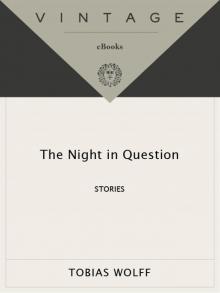 The Night in Question: Stories
The Night in Question: Stories In the Garden of the North American Martyrs
In the Garden of the North American Martyrs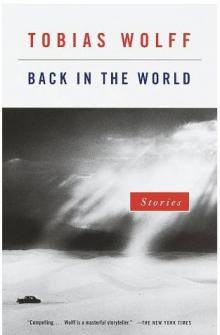 Back in the World: Stories
Back in the World: Stories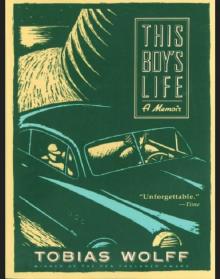 This Boy's Life
This Boy's Life Old School
Old School In Pharaoh's Army: Memories of the Lost War
In Pharaoh's Army: Memories of the Lost War Our Story Begins: New and Selected Stories
Our Story Begins: New and Selected Stories The Barracks Thief
The Barracks Thief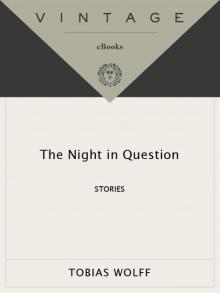 The Night In Question
The Night In Question In Pharaoh's Army
In Pharaoh's Army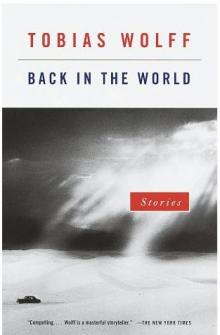 Back in the World
Back in the World